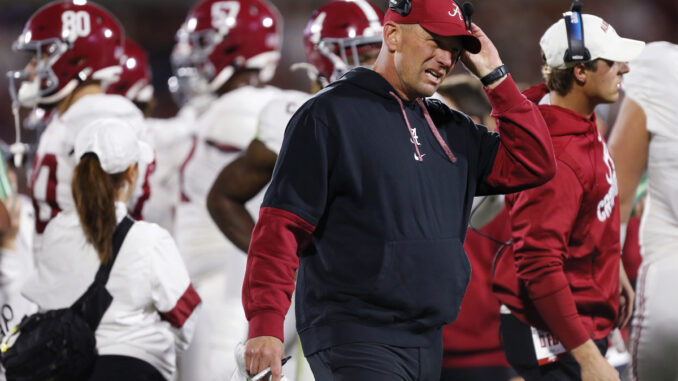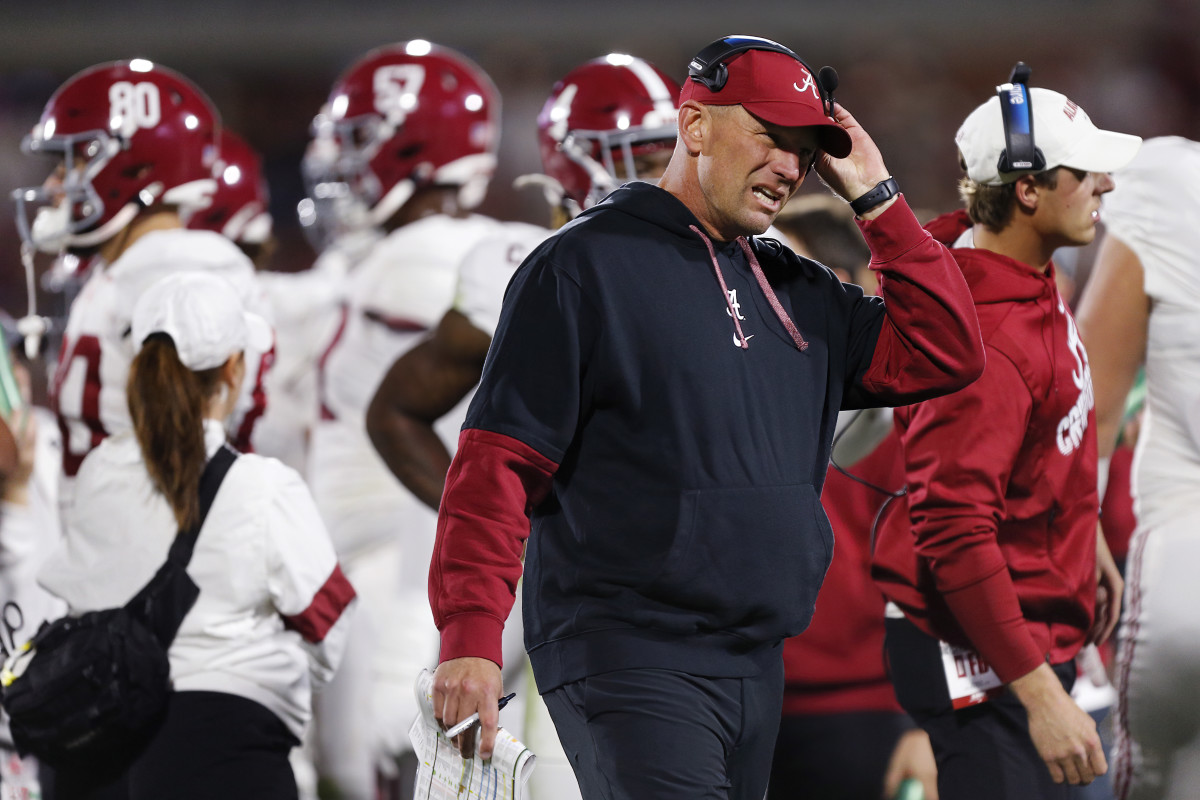
ESPN Analyst Claims Alabama Football Has ‘Diminished’: A Deep Dive into the Tide’s Current State
Alabama football has long been considered one of the most dominant forces in college football. Under head coach Nick Saban, the Crimson Tide has become synonymous with championship aspirations, an ironclad defense, and a ruthless, efficient offense. However, an ESPN analyst recently made a bold statement that has set the college football world abuzz, claiming that Alabama football has “diminished.” This declaration has sent shockwaves through the sports community, prompting fans, analysts, and players to question whether the once invincible Alabama dynasty is beginning to show signs of wear.
Is Alabama football truly on the decline, or is this merely a case of sky-high expectations from a program that has set the bar so high that any perceived setback is seen as a fall from grace? In this article, we will take a deep dive into this claim, examining Alabama’s recent performance, the state of the program, the challenges it faces, and the potential for a future rebound.
The Analyst’s Perspective: What Is Being Said?
The ESPN analyst in question, whose identity has sparked much debate, made several pointed remarks regarding the state of Alabama football. According to the analyst, Alabama’s dominance in the college football landscape has “diminished” in recent years, citing multiple factors that have contributed to the program’s perceived decline. The analyst’s comments focused primarily on the following areas:
- Recruiting: Alabama’s Recruits Aren’t What They Used to Be One of the primary arguments put forth was that Alabama’s recruiting prowess, which once set the standard for the rest of college football, has started to show cracks. While Alabama still lands elite recruits, especially on the defensive side of the ball, the analyst believes that other programs—most notably Georgia, Ohio State, and LSU—have started to close the gap in terms of securing top-tier talent.
- Offensive Struggles and Quarterback Play For years, Alabama’s offense was a juggernaut that could score at will, powered by some of the best quarterbacks in college football. However, in recent seasons, the program has struggled to develop consistent quarterback play. The departure of former Heisman Trophy-winning quarterback Bryce Young to the NFL left a significant void. Although Alabama has talented quarterbacks, the analyst argues that the Tide has not had the same level of success in developing signal-callers who can lead the offense with the same authority as in years past.
- The Rise of Other Programs The analyst points to the rise of other powerhouse programs like Georgia, Clemson, and Ohio State, who have not only recruited at an elite level but also won national championships and challenged Alabama’s throne in recent years. Alabama’s once ironclad hold on the SEC and college football has loosened, with other teams starting to compete at a higher level.
- Inconsistent Play in Big Games While Alabama remains a force to be reckoned with in the regular season, the analyst highlighted the team’s struggles in recent high-stakes games. From the SEC Championship to the College Football Playoff, Alabama has experienced uncharacteristic losses and close calls. This lack of dominance in critical moments has contributed to the perception that the program is on the decline.
Examining the Evidence: Is Alabama Football Really Diminishing?
To understand whether the analyst’s claims have merit, we must look at several key factors: recruiting, performance on the field, coaching, and the overall trajectory of the program.
Recruiting: The Tide’s Talent Pipeline
It’s no secret that recruiting has been the lifeblood of Alabama’s success under Nick Saban. From 2008 to 2020, Alabama routinely brought in top-ranked recruiting classes, with each new batch of talent seemingly better than the last. The program was a recruiting machine, plucking the best high school players from all corners of the country and molding them into NFL-caliber players.
However, in recent years, other programs have begun to catch up. Georgia, under head coach Kirby Smart, has become an elite recruiter, bringing in top-tier talent and winning championships along the way. Ohio State, led by Ryan Day, continues to produce some of the most explosive offenses in college football. LSU, despite recent struggles, still remains a competitive force in the SEC.

While Alabama continues to recruit at a high level, the margin by which they win recruiting battles has shrunk. The top players in the nation are increasingly choosing schools other than Alabama, and this is particularly evident in the defensive backfield and quarterback positions. For example, in 2023, Alabama lost out on several high-profile recruits to other programs, which led to questions about the program’s recruiting trajectory.
That said, Alabama remains a top contender for many of the country’s best recruits, and its 2024 recruiting class is still ranked among the best in the nation. This suggests that while the competition has gotten stronger, Alabama has not yet fallen off the map.
Offensive Struggles: Quarterback Play and Scheme
Under Saban, Alabama’s offense has seen a transformation from a run-heavy, pro-style attack to a more modern, spread offense designed to take advantage of elite quarterbacks and wide receivers. Players like Tua Tagovailoa, Mac Jones, and Bryce Young helped cement Alabama’s place as a national powerhouse with prolific offenses that could score in bunches.
However, since Bryce Young’s departure to the NFL, Alabama has struggled to find consistent quarterback play. Jalen Milroe, for example, showed flashes of brilliance but struggled with accuracy and consistency. The lack of a true superstar quarterback has raised questions about whether Alabama can remain as dominant in a league where quarterback play is critical.
Moreover, Alabama’s offense has seemed less innovative compared to other high-powered offenses around the country. Programs like Ohio State, Oklahoma, and even Georgia have developed offenses that are more dynamic and difficult to defend against. Alabama, meanwhile, has appeared to rely more on traditional concepts rather than adapting to new trends in college football.
This perceived stagnation on offense has led some to question the program’s future, especially given that modern football is becoming more and more defined by explosive, high-scoring offenses. If Alabama cannot find a way to adapt to the changing landscape of college football, they may continue to fall behind other programs that are evolving faster.
The Rise of Other Powerhouses
One of the most compelling arguments made by the analyst is the rise of other college football programs that are no longer intimidated by Alabama’s dominance. Georgia, under Smart, has taken its recruiting and development to the next level, winning national championships in 2021 and 2022. Georgia’s defense, which is arguably as dominant as Alabama’s once was, has established itself as the gold standard in college football. Georgia has surpassed Alabama as the premier program in the SEC, at least for the time being.
Ohio State, Clemson, and LSU are also challenging Alabama’s position atop the college football hierarchy. While Alabama continues to recruit well, these programs have shown they are capable of winning national championships and competing at the highest level. The competition for top recruits, championship titles, and playoff spots is fiercer than ever, and Alabama is no longer the guaranteed favorite it once was.
This rise of other programs, coupled with Alabama’s recent struggles in the postseason, has led some to believe that the Tide is no longer the indomitable force it once was.
Inconsistent Big Game Performances
One of the most significant criticisms of Alabama in recent seasons has been their inability to perform consistently in big games. While Alabama remains a formidable team in the regular season, they have suffered unexpected losses in high-profile games, such as the SEC Championship and the College Football Playoff.
In the 2022 season, Alabama was left out of the College Football Playoff for the first time since its inception in 2014. While the Tide still had a strong season, their inability to win the SEC Championship and secure a playoff spot was seen as a sign of regression. In 2021, Alabama was defeated by Georgia in the National Championship game, marking a shift in the balance of power in the SEC.
These uncharacteristic losses in critical moments have led some to question whether Alabama still has the same dominance and resilience that once defined the program. In past seasons, the Crimson Tide were virtually unstoppable when the stakes were highest. Now, with more competitive programs emerging and Alabama facing greater pressure, they have struggled to maintain that same edge.
What’s Next for Alabama?
Despite the criticisms leveled against them, it’s important to recognize that Alabama is far from a broken program. Nick Saban remains one of the best coaches in college football, and the Tide continues to recruit at an elite level. While there are certainly areas where Alabama has shown vulnerability, such as in quarterback development and offensive innovation, the program has the resources and infrastructure to bounce back.
Additionally, Saban’s ability to adapt and evolve has been one of his defining traits. Over the years, he has transformed Alabama from a traditional power running team to a modern, pass-heavy offense. There’s little doubt that he will continue to adjust to the changing landscape of college football and find new ways to win.
In conclusion, while there are valid concerns about Alabama’s recent performance, the program is still one of the premier teams in college football. The “diminishment” of Alabama may be overstated, as the team is still a contender on a national level. However, the rise of other programs and the challenges they present will force Alabama to evolve and continue to compete at the highest level. The coming seasons will determine whether the Tide can regain its former dominance or if the program will face an era of diminished expectations.

Leave a Reply